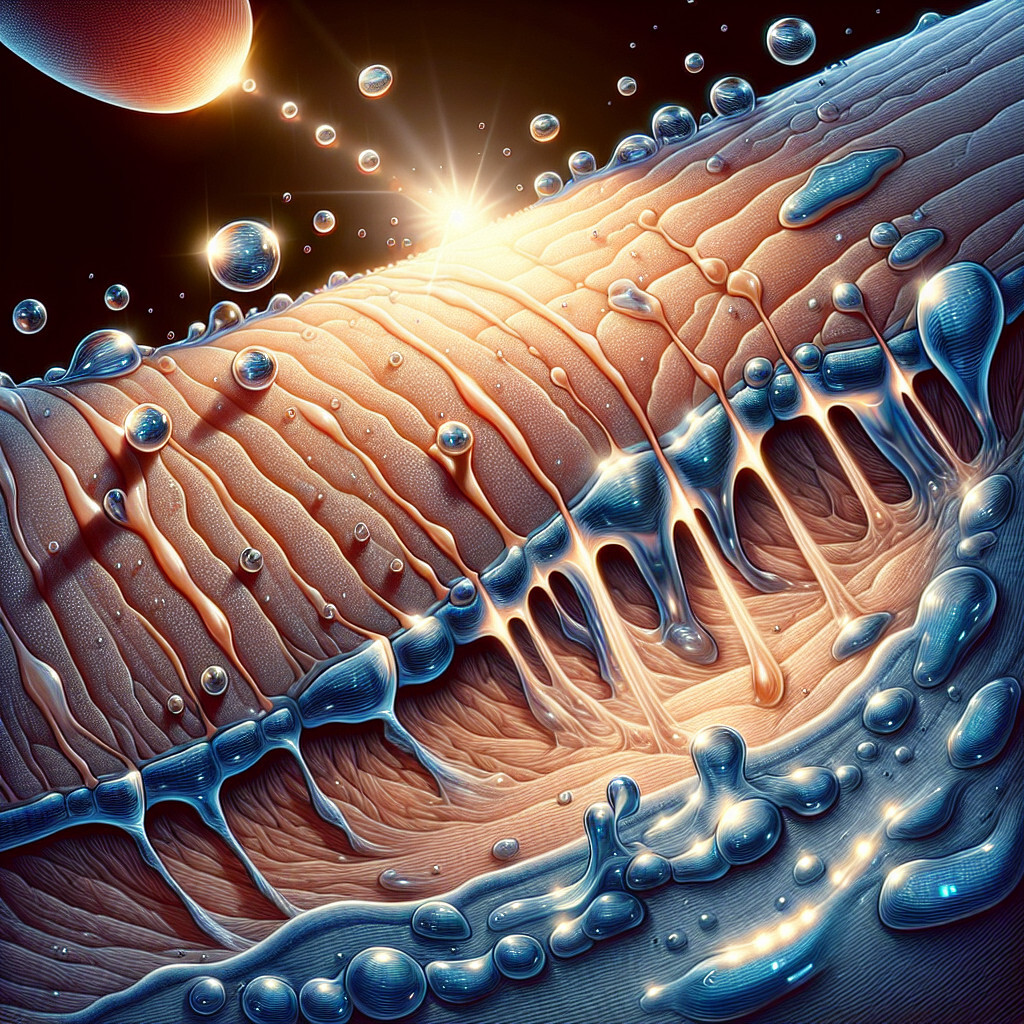-
Table of Contents
“Water: The Natural Elixir for Radiant Skin.”
Introduction

Water plays a crucial role in maintaining skin health. It aids in hydration, keeping the skin moist, supple, and elastic, thereby reducing the chances of developing skin problems like dryness, flakiness, and wrinkles. Water also helps in flushing out toxins from the body, which can contribute to a clear and glowing complexion. Additionally, it aids in the proper functioning of sweat and oil glands, helping to maintain the skin’s pH balance and protect against harmful bacteria. Thus, water significantly affects the skin’s overall health and appearance.
Understanding the Role of Hydration in Maintaining Skin Health
Water, the elixir of life, plays a pivotal role in maintaining the health of our skin. It is a well-known fact that our bodies are composed of approximately 60% water, and this vital fluid is essential for the proper functioning of all our bodily systems. However, the importance of water for our skin, the largest organ of our body, is often overlooked. Understanding the role of hydration in maintaining skin health is crucial for achieving a radiant, youthful complexion.
The skin, being the outermost layer of our body, is the first line of defense against environmental aggressors. It is constantly exposed to harsh weather conditions, pollutants, and harmful UV rays, which can cause damage and lead to premature aging. Adequate hydration helps to strengthen the skin barrier, making it more resilient against these external factors. When the skin is well-hydrated, it is better equipped to combat these stressors and can effectively prevent the onset of various skin conditions such as dryness, flakiness, and irritation.
Moreover, water is instrumental in maintaining the elasticity and suppleness of the skin. It aids in the production of collagen, a protein that provides structure to the skin and helps to keep it firm and taut. Dehydration can lead to a decrease in collagen production, resulting in sagging skin and the formation of wrinkles and fine lines. Therefore, drinking plenty of water can help to delay the signs of aging and promote a youthful appearance.
In addition to its role in skin structure, water also plays a vital role in the process of detoxification. It aids in flushing out toxins from the body, which can otherwise accumulate and cause various skin problems such as acne, dullness, and uneven skin tone. By promoting the elimination of toxins, water helps to maintain a clear, glowing complexion.
Furthermore, water is essential for the optimal functioning of the skin cells. It delivers essential nutrients to the skin cells and helps to maintain their health and vitality. When the skin cells are well-nourished and hydrated, they can perform their functions more efficiently, leading to healthier, more radiant skin.
However, it is important to note that while drinking water is essential for skin health, it is not sufficient on its own. Topical hydration is equally important. Using moisturizers and hydrating serums can help to lock in moisture and prevent the skin from drying out. Moreover, it is also crucial to protect the skin from excessive sun exposure, as UV rays can cause dehydration and damage the skin.
In conclusion, water plays a multifaceted role in maintaining skin health. It strengthens the skin barrier, maintains skin structure, aids in detoxification, and nourishes the skin cells. Therefore, adequate hydration, both internally and externally, is key to achieving healthy, glowing skin. However, it is also important to complement this with a balanced diet, regular exercise, and a good skincare routine for optimal skin health. Understanding the role of hydration in maintaining skin health can help us make informed decisions about our skincare and lifestyle choices, leading to better skin health and overall well-being.
The Impact of Water Quality on Skin Conditions
Water, the elixir of life, plays a pivotal role in maintaining the health and vitality of our skin. It is a well-known fact that staying hydrated is essential for overall health, but the quality of the water we consume and use externally can have a profound impact on our skin conditions. This article aims to shed light on the intricate relationship between water quality and skin health.
Water quality refers to the physical, chemical, and biological characteristics of water. It is a measure of the condition of water relative to the requirements of one or more biotic species and or to any human need or purpose. The quality of water can significantly influence the health of our skin, which is the largest organ of our body and the first line of defense against environmental aggressors.
Hard water is one of the most common water quality issues affecting skin health. Hard water contains a high concentration of minerals such as calcium and magnesium. While these minerals are not harmful to ingest, they can wreak havoc on the skin when present in bathing water. The minerals in hard water can strip the skin of its natural oils, leading to dryness, irritation, and exacerbation of conditions like eczema and psoriasis. Moreover, hard water can also interfere with the effectiveness of skincare products, making them less able to nourish and protect the skin.
On the other hand, soft water, which has a low concentration of minerals, can be more beneficial for the skin. It is gentle, helps to keep the skin soft and hydrated, and allows skincare products to work more effectively. However, it’s important to note that excessively soft water can also leave the skin feeling slippery and not completely clean, due to its inability to completely rinse off soap.
Chlorine, another common component in tap water, can also have detrimental effects on the skin. While chlorine is necessary to kill harmful bacteria in water, it can also strip the skin of its natural oils, leading to dryness and irritation. People with sensitive skin or conditions like ecicema and psoriasis may find their symptoms worsen after exposure to chlorinated water.
Furthermore, the temperature of the water we use on our skin can also have an impact. Hot water can strip the skin of its natural oils more quickly than lukewarm or cold water, leading to dryness and potential irritation. On the other hand, cold water can help to tighten the skin and reduce puffiness, but it may not be as effective at removing dirt and oil.
In conclusion, the quality of water we consume and use externally plays a significant role in the health of our skin. Hard water, soft water, chlorinated water, and the temperature of water all have their own unique effects on our skin. Therefore, it is crucial to be aware of the quality of water in our homes and take necessary measures to ensure it is suitable for our skin. This could involve installing a water softener, using a shower filter to remove chlorine, or adjusting the temperature of our bathing water. By understanding the impact of water quality on skin conditions, we can make informed decisions to protect and nourish our skin.
How Dehydration Affects Your Skin: A Comprehensive Guide
Water, the elixir of life, plays a crucial role in maintaining the health and vitality of our skin. It is a well-known fact that our bodies are composed of approximately 60% water, and this vital fluid is essential for the proper functioning of all our bodily systems, including our skin. This article aims to provide a comprehensive guide on how dehydration affects your skin.
Dehydration occurs when the body loses more water than it takes in. This imbalance disrupts the body’s ability to carry out its normal functions. When we fail to consume an adequate amount of water, our skin, being the largest organ in the body, is one of the first to show signs of distress.
The skin is composed of three layers: the epidermis, the dermis, and the subcutaneous tissue. The epidermis, or outermost layer, provides a waterproof barrier and creates our skin tone. The dermis, beneath the epidermis, contains tough connective tissue, hair follicles, and sweat glands. The deeper subcutaneous tissue is made of fat and connective tissue. Water is vital for the proper functioning of these layers. It helps maintain skin elasticity, suppleness, and resilience.
When the body is dehydrated, it leads to dry, tight, and flaky skin. Dehydration also makes the skin appear dull and enhances the visibility of wrinkles and pores. This is because when the body is dehydrated, it responds by conserving water for vital functions, thereby reducing the water supply to the skin.
Moreover, dehydration can lead to a decrease in the skin’s elasticity. This is due to the lack of sufficient water content in the dermis layer, which is responsible for the skin’s elasticity and resilience. When the skin loses its elasticity, it becomes more prone to sagging and the formation of fine lines and wrinkles.
In addition to these visible effects, dehydration can also lead to skin conditions such as eczema and psoriasis. These conditions are characterized by inflammation, redness, and dry, itchy skin. When the skin is dehydrated, it weakens the skin’s barrier function, making it more susceptible to irritants and allergens, which can trigger these conditions.
Furthermore, dehydration can also affect the skin’s ability to heal itself. The skin has a remarkable ability to repair and regenerate itself. However, when the body is dehydrated, this process is hindered. This can lead to slower wound healing and an increased risk of scarring.
In conclusion, water is essential for maintaining healthy, glowing skin. Dehydration can lead to a host of skin problems, including dryness, dullness, decreased elasticity, and an increased risk of skin conditions and scarring. Therefore, it is crucial to ensure that you consume an adequate amount of water each day. This not only helps maintain the health of your skin but also contributes to the overall well-being of your body. Remember, healthy skin is a reflection of overall wellness. So, drink up and let your skin glow with health and vitality.
Exploring the Benefits of Water for Anti-Aging Skin Care
Water, the most abundant substance on earth, is often overlooked in its role as a vital component in skincare. However, it is an essential element in maintaining skin health and combating the signs of aging. This article aims to explore the benefits of water for anti-aging skincare, shedding light on how this simple, yet powerful, substance can contribute to a youthful and radiant complexion.
The skin, the body’s largest organ, is composed of approximately 64% water. This high water content is crucial for the skin’s function as a protective barrier against external factors such as harmful UV rays, pollutants, and pathogens. When the skin’s water content decreases, it becomes dry, tight, and less resilient, leading to the formation of wrinkles and fine lines. Therefore, maintaining adequate hydration is a fundamental step in anti-aging skincare.
Water plays a significant role in the skin’s natural regeneration process. It aids in the removal of dead skin cells, promoting the growth of new ones. This cell turnover is essential for maintaining a youthful appearance as it results in smoother, brighter, and more even-toned skin. Moreover, water helps to improve skin elasticity, which is key to preventing sagging and the formation of wrinkles.
In addition to its role in skin cell regeneration, water also supports the skin’s ability to heal. It is involved in the transport of essential nutrients to the skin cells, promoting their health and vitality. Furthermore, water aids in the removal of toxins from the skin, a process that not only contributes to a clearer complexion but also helps to slow down the aging process.
Drinking an adequate amount of water daily is one of the simplest and most effective ways to ensure that the skin remains hydrated. However, the benefits of water for anti-aging skincare are not limited to its consumption. Topical application of water-based skincare products can also contribute to maintaining the skin’s hydration levels. These products, which include cleansers, toners, and moisturizers, work by delivering water to the skin and helping to lock it in.
It is also worth noting that the temperature of the water used in skincare routines can have an impact on the skin’s health and appearance. While hot water can strip the skin of its natural oils, leading to dryness and premature aging, cold water can help to tighten the skin and reduce the appearance of pores. Therefore, it is recommended to use lukewarm water when cleansing the skin and to finish with a splash of cold water to invigorate the skin and enhance its radiance.
In conclusion, water is a powerful ally in the fight against aging. Its role in maintaining skin hydration, promoting cell regeneration, supporting skin healing, and enhancing skin radiance is invaluable. By ensuring adequate water intake and incorporating water-based products into skincare routines, it is possible to harness the anti-aging benefits of water and achieve a healthier, more youthful complexion. Therefore, the importance of water in skincare should not be underestimated, and its role in anti-aging skincare deserves greater recognition.
Q&A
1. Question: How does water affect skin hydration?
Answer: Water helps to maintain skin hydration. It replenishes the skin tissue and increases its elasticity, preventing dryness and flakiness.
2. Question: Can water improve skin complexion?
Answer: Yes, drinking enough water can help to flush out toxins from the body, which can improve skin complexion and make it look more radiant and clear.
3. Question: Can too much water exposure damage the skin?
Answer: Yes, excessive water exposure, especially hot water, can strip the skin of its natural oils leading to dryness, irritation, and potential damage.
4. Question: Does water temperature affect the skin?
Answer: Yes, water temperature can affect the skin. Cold water can help to tighten the skin and close pores, while warm water can help to open pores and remove dirt and oil. However, hot water can strip the skin of its natural oils, leading to dryness and irritation.
Conclusion
Water plays a crucial role in maintaining skin health. It keeps the skin hydrated, plump, and elastic, reducing the appearance of wrinkles and fine lines. It also aids in detoxification and nutrient absorption, promoting a healthy, glowing complexion. However, excessive exposure to water, especially hot water, can strip the skin of its natural oils, leading to dryness and irritation. Therefore, while water is essential for skin health, it should be balanced with proper skincare practices.






